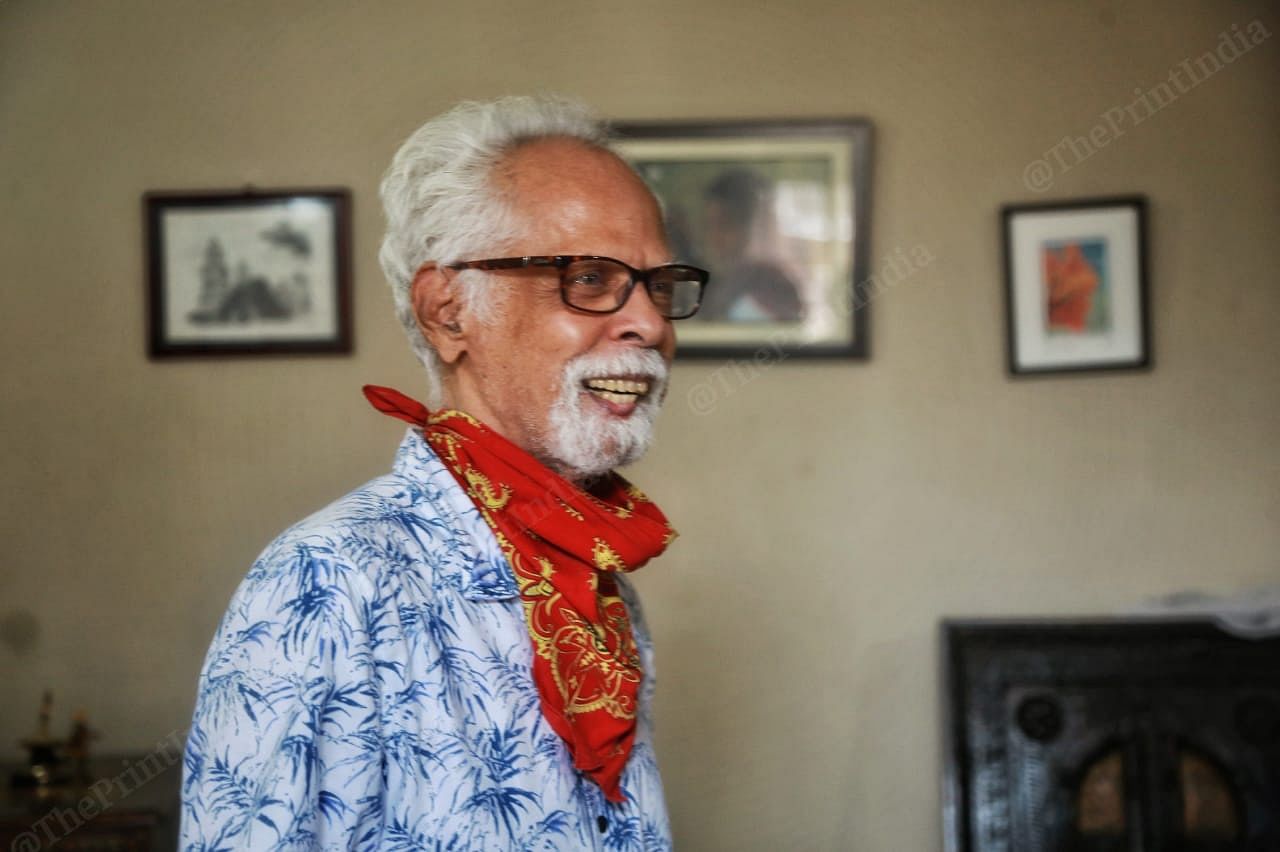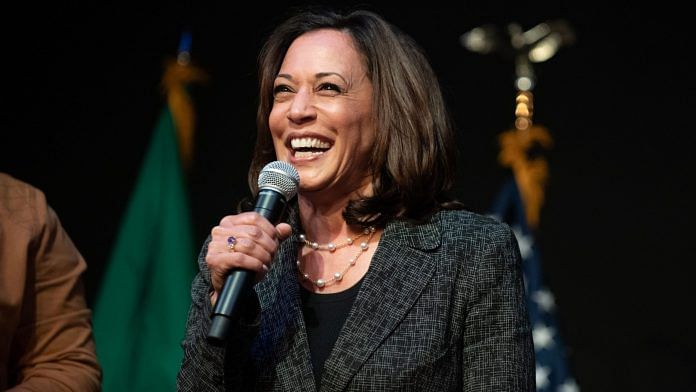New Delhi: It was an early morning call from Chennai that woke up Professor Gopalan Balachandran Wednesday. It was his sister and she had big news — their niece Kamala Harris, the daughter of their late sister — had entered the race to be US vice-president.
“My sister called me up at 5 am to tell me that Joe Biden has chosen Kamala to be his running mate,” he said, referring to the Democratic presidential nominee who has himself served two terms as vice-president (2008-2016) under Barack Obama.
It was great news, but Balachandran, a former consultant at the New Delhi-based think-tank Institute for Defence Studies and Analyses, was hardly surprised.

“Having studied US policy and politics for many years, I knew Kamala was the perfect candidate. The only thing I felt is, why did it take them so long to decide?” he said, speaking to ThePrint at his Delhi residence.
A public figure of mixed Indian-Jamaican roots, Harris has had more than one notable moment in her career. When she was sworn in as a member of the Senate, or the upper chamber of the US Congress, from California in 2017, she became the first South Asian-American to do so. She was also only the second African-American woman ever elected to the Senate.
Since Wednesday morning, Balachandran said, his phone has been constantly ringing with congratulatory calls.
According to Balachandran, Harris’ ascent as a vice-presidential nominee gains all the more significance in the context of the recent Black Lives Matter movement, which has spawned widespread citizen protests against what is seen as systemic racism in the US.
“Due to the Black Lives Matter movement, the African-American community was looking for key representation. Her credentials as a district attorney and senator, too, were important, along with the fact that she’s a woman,” said Balachandran.
Also read: Hinduphobia makes Kamala Harris’ identity a liability. So she is ‘Black’ in US media
Daughter of immigrant academics
After Kamala’s nomination was announced late Tuesday night (IST), her sister Maya put out a tweet saying her achievements need to be viewed through the lens of their mother’s influence on her.
You can’t know who @KamalaHarris is without knowing who our mother was. Missing her terribly, but know she and the ancestors are smiling today. #BidenHarris2020 pic.twitter.com/nmWVj90pkA
— Maya Harris (@mayaharris_) August 12, 2020
Shyamala Gopalan, who died of cancer in 2009, was the daughter of a Tamil Brahmin diplomat, P.V. Gopalan, who also participated in the freedom movement.
“Kamala Harris’ grandfather, P.V. Gopalan, worked on the rehabilitation of refugees from East Pakistan in India. Later, because of his experience, he became an adviser to the Zambian government, while his wife Rajam built a reputation for her social work,” notes a report in The Hindu.
After completing her graduation in home science from Delhi University at the age of 19, Gopalan moved to the US to avoid marriage. There, she studied nutrition and endocrinology at one of the country’s top institutions, University of California, Berkeley, as part of a lifelong desire to strengthen humanity’s protection against breast cancer. She completed her PhD at 25.
It was during her days as a student that she came to know a Jamaican immigrant, Donald Harris, who was pursuing his PhD in economics at the same university. It was the 1960s, and UC Berkeley emerged as a hot-bed for student-centric civil rights activism that was taking the US by storm then and challenging years of institutionalised racism. In these heady times, the two immigrants of colour fell in love with each other and envisaged a life together.
“They both identified as people of colour and people who were oppressed by a white-male-dominated world. Their fields were science and economics — there were not many Indian women or black men,” Kamala’s niece Meena Harris told The New Yorker for a July 2019 profile.
The two got married while still in graduate school. Kamala was born in October 1964, and Maya followed two years later. But the marriage was short-lived.
Under the wings of a strong mother
After Donald got his doctorate, the family initially moved wherever he took jobs — “University of Illinois at Urbana-Champaign, at Northwestern, and at the University of Wisconsin”.
Eventually, he took up a teaching job at Stanford — where he is still professor emeritus — and her mother Gopalan became a cancer researcher at UC Berkeley, approximately 80 km away.
When Harris was seven, her parents divorced and Shyamala was given primary custody of their daughters. Growing up with Shyamala, an active campaigner for civil rights and a regular at pride parades, had a deep impact on shaping Harris’ views on life, career, and more complex issues of social policy and politics, as she has often acknowledged in public addresses.
“Her mother’s life was an example to Kamala. The fact that she was so active in the civil rights movement and that she raised two children of colour as a single parent exerted enormous influence on Kamala and her politics,” said Balachandran.
Kamala has described their family as a matriarchal family unit, where they were referred to as “Shyamala and the girls”. In her 2019 memoirs The Truth We Hold, Kamala writes that her mother “knew that her adopted homeland would see Maya and me as black girls, and she was determined to make sure we would grow into confident, proud black women”.
The house Kamala and her sister grew up in was “infused” with the Hindu roots of Shyamala, a Tamil Brahmin from Chennai, and “cosmology”.
The Harris sisters’ Chennai-based aunt Dr Sarala Gopalan was quoted as saying in a 2016 Rediff interview that, before every moment of reckoning, Kamala would call her up and ask to “break coconuts at the temple”.
Also read: Kamala Harris is vocal on Kashmir, ‘unbreakable bond’ with India & loves her idli-sambhar
Estranged from dad
Although their childhood was spent away from their father, the influence of their black heritage was just as strong for the sisters, in no small part because of Shyamala’s active advocacy on civil rights issues.
After their parents separated, Kamala and Maya used to spend their summers with Donald, and sometimes visited Jamaica with him.
Maya has been quoted as saying their father was not around after the divorce, and their experience and relationship with ‘blackness’ is through being raised in these communities in Berkeley and Oakland, and not through the lens of being Caribbean.
Over the years, Donald has not participated in Kamala’s public life, except the one time he objected to her use of a stereotype associated with Jamaicans. On a radio show in February 2019, Kamala admitted to having smoked a cannabis joint in college. When asked if she supported marijuana legalisation, Kamala responded laughing, “Half my family’s from Jamaica—are you kidding me?”
This didn’t go down well with her father, who said in a statement to a Jamaican-diaspora portal that his “deceased parents must be turning in their grave right now to see their family’s name, reputation and proud Jamaican identity being connected, in any way, jokingly or not with the fraudulent stereotype of a pot-smoking joy seeker and in the pursuit of identity politics”.
Also Read: Why Kamala Harris, with Indian & Black heritage, is a safe and smart choice for US VP




Kamala ‘s previous comments shows that she is anti caa and against repealation of 370 .It means that if she wins she may not support modi govt.Rather she will create more trouble for modi government in international flora and will oppose every step taken for survival of hinduism .she has never uttered a word in favour of the hindus of pakistan or afganistan or bangladesh .
She is not getting anywhere.
In the USA they say that she be one heart beat away from ruling the world
Dream on she is nothing but a bag of wind